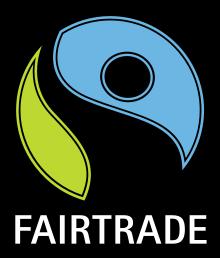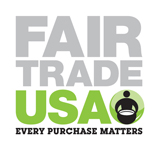 |
 |
The Fair Trade Certified Mark is a fair trade certification mark used in Canada and in the United States. It appears on products as an independent guarantee that disadvantaged producers in the developing world are getting a better deal. The Fair Trade Certified Mark is the North American equivalent of the International Fairtrade Certification Mark used in Europe, Africa, Asia, Australia and New Zealand.

A fair trade certification is a product certification within the market-based movement fair trade. The most widely used fair trade certification is FLO International's, the International Fairtrade Certification Mark, used in Europe, Africa, Asia, Australia and New Zealand. Fair Trade Certified Mark is the North American equivalent of the International Fairtrade Certification Mark. As of January 2011, there were over 1000 companies certified to the FLO International's certification and a further 1000 or so certified to other ethical and fairtrade certification schemes around the world.

The International FAIRTRADE Certification Mark is an independent certification mark used in over 50 countries. It appears on products as an independent guarantee that a product has been produced according to Fairtrade political standards.
For a product to carry either Certification Marks, it must come from FLO-CERT inspected and certified producer organizations. The crops must be grown and harvested in accordance with the International Fairtrade standards set by FLO International. The supply chain is also monitored by FLO-CERT to ensure the integrity of labelled products. Only Fair Trade USA or Fairtrade Canada (formerly "TransFair USA" and "TransFair Canada," respectively) licensees can use the Fair Trade Certified Mark on their products, however a gradual phase-out of this mark began in Canada in 2011.

Fair Trade USA, formerly "TransFair USA", is a 501(c)(3) non-profit organization, that sets standards, certifies, and labels products that promote sustainable livelihoods for farmers and workers and protect the environment.
Fairtrade Canada, formerly TransFair Canada, is a national non-profit certification and public education organization promoting Fairtrade certified products in Canada to improve the livelihood of developing world farmers and workers. It is the Canadian member of FLO International, which unites 24 fair trade producer and certification initiatives across Europe, Asia, Latin America, North America, Africa, Australia and New Zealand.
The Canadian Fair Trade Certified Mark was introduced by TransFair Canada on the Canadian market in 1997.
The American Fair Trade Certified Mark was introduced by TransFair USA on the American market in 1998.
In 2010, Canada began actively promoting both the Fair Trade Certified Mark and the International Fairtrade Certification Mark as part of a transition process towards the latter, which became the primary Fairtrade Certification Mark in 2011.
In 2012 a variation of the US Fair Trade certification mark was adopted with the benefit of being registered globally as a trade mark. The mark is designed to pop better on the shelf through a far simpler design and the use of color. The one basket with outstretched hands indicates sharing and a "give and take" between producers and purchases. The green signals the environmental strength of Fair Trade. [1]








